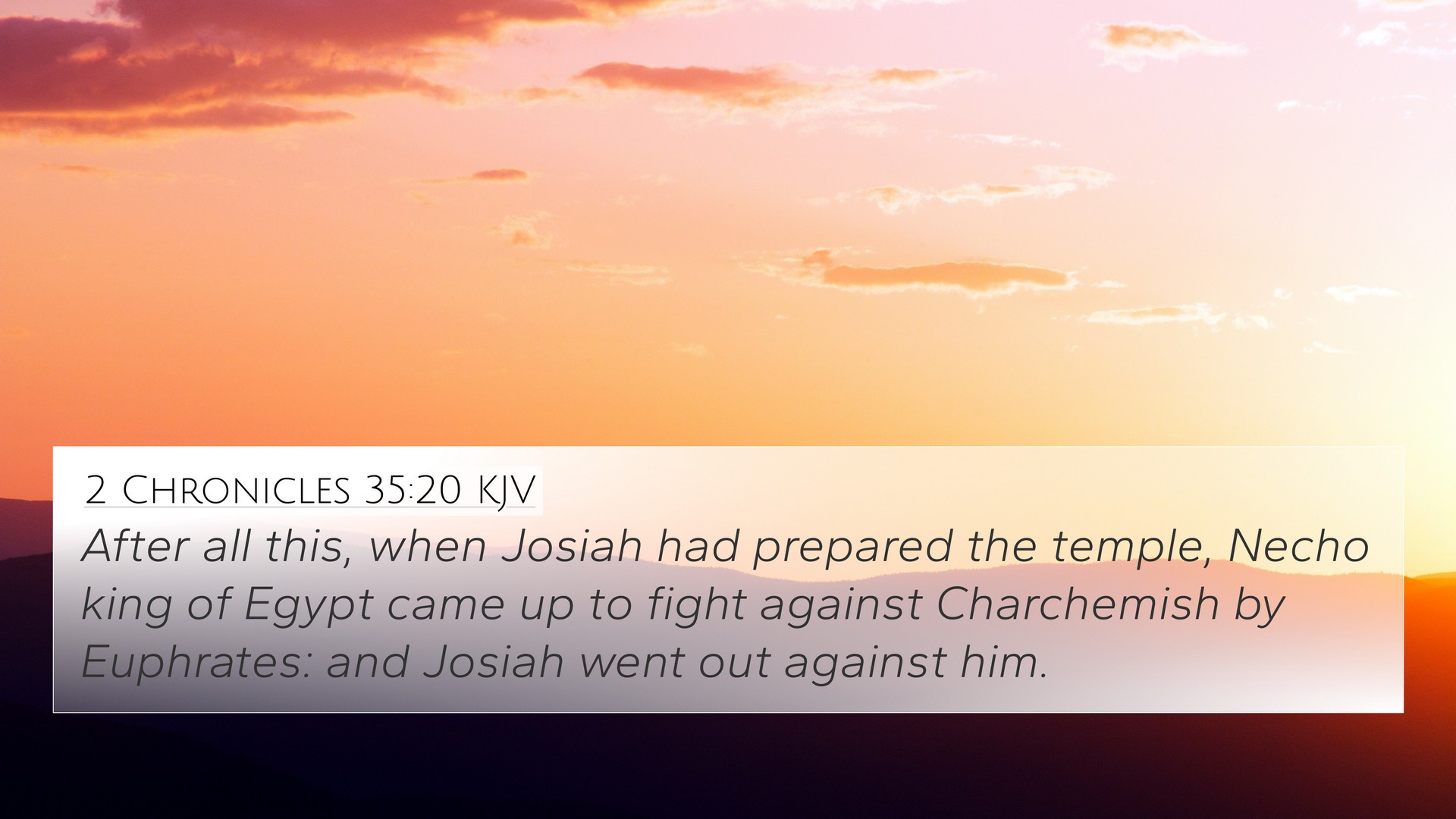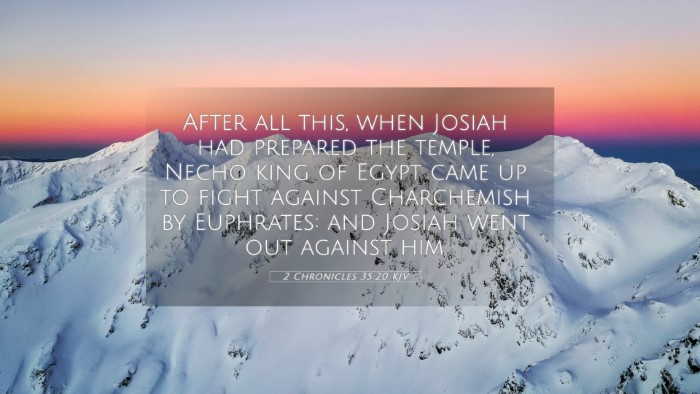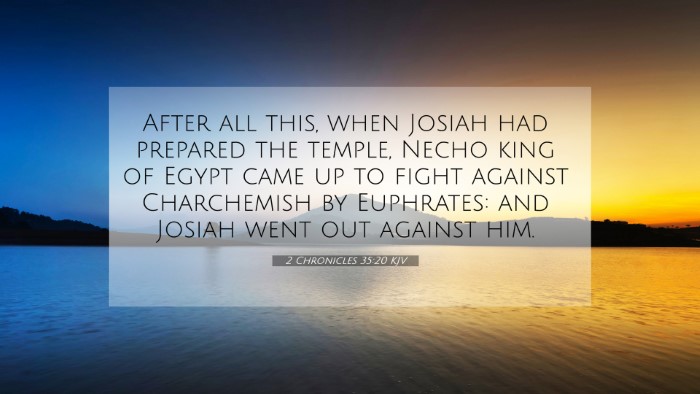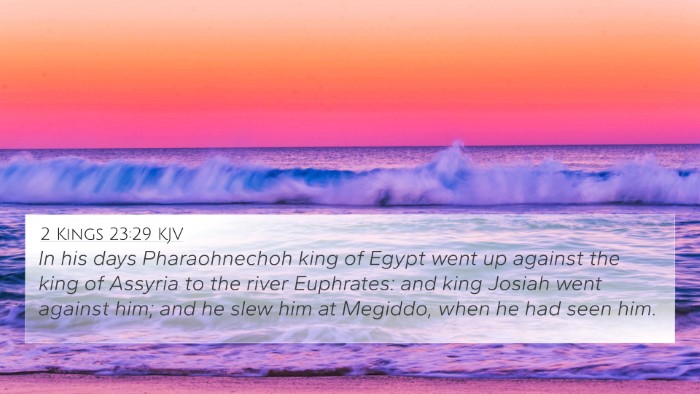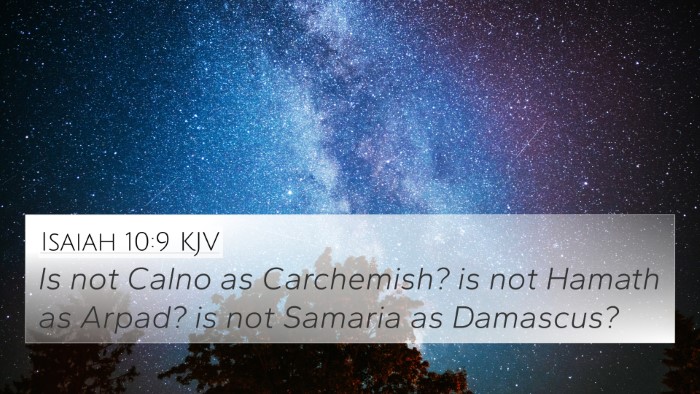Understanding 2 Chronicles 35:20 - A Comprehensive Bible Verse Interpretation
The verse 2 Chronicles 35:20 states:
"After all this, when Josiah had prepared the temple, Neco king of Egypt came up to fight against Carchemish by the Euphrates; and Josiah went out against him."
This verse marks a pivotal moment in the reign of King Josiah, highlighting his zealous commitment to the restoration of the temple and the worship of Yahweh, as well as his subsequent confrontation with external threats.
Contextual Analysis
To fully grasp the significance of this verse, it is important to explore the context both within 2 Chronicles and the broader narrative of scripture.
Historical Background
Josiah was the last great king of Judah, remembered for his religious reforms that aimed to eradicate idolatry and restore proper worship in Jerusalem. His efforts included repairing the temple and reinstituting Passover observances.
Connections to Other Biblical Texts
-
2 Kings 23:29-30 - This parallel passage discusses Josiah’s confrontation with Pharaoh Neco, indicating the seriousness of the conflict.
-
Jeremiah 46:2 - Here, the prophet Jeremiah speaks against the same Egyptian king, providing a prophetic context to the battle described in Chronicles.
-
2 Chronicles 34:1-3 - The preceding verses illustrate Josiah's commitment to reform, establishing the groundwork for understanding his character and motivations.
-
Isaiah 19:1 - This verse describes the judgment on Egypt, further contextualizing the dynamics of the era.
-
Ezekiel 30:4 - This alludes to the calamity to come upon Egypt due to its military struggles, hinting at broader implications for Josiah’s conflict with Neco.
-
2 Chronicles 35:22 - This verse illustrates Josiah’s decision to confront Neco, despite being forewarned by the king of Egypt to refrain from engagement.
-
Deuteronomy 20:1 - God’s assurance in warfare provides foundational understanding for why Josiah may have felt compelled to act in this situation.
-
1 Chronicles 5:21 - Further insights into battles in the region that link to the geopolitical realities experienced by Judah and its kings.
-
Psalm 119:105 - Indirectly, the theme of divine guidance in decisions echoes through the narrative, as Josiah seeks God’s favor.
Thematic Insights
The encounter between Josiah and Neco carries significant theological implications:
-
Divine Mandate and Guidance: Josiah believed he was acting on behalf of God’s covenant people; however, the text suggests a warning against presumption in pursuing righteous causes without divine sanction.
-
Consequences of Actions: Josiah’s decision highlights the complex interplay between faith-based actions and unforeseen outcomes.
-
Faithfulness Versus Political Strategy: Josiah’s dilemma can be interpreted as a struggle between his pursuit of religious fidelity and the harsh realities of political engagement.
Cross-Referencing Biblical Texts
Engaging in cross-referencing is critical for deeper understanding. Here are tools and methods for cross-referencing:
-
Bible concordance: Utilize a concordance to find related terms and concepts throughout scripture for deeper insights.
-
Bible cross-reference guide: Refer to guides that provide thematic links across various books in the Bible.
-
Cross-reference Bible study: Develop study sessions focused on themes and events that connect different scriptures.
-
Bible reference resources: Various publications and online tools are available to support detailed studies of biblical relationships.
-
Identifying connections between Old and New Testament: Explore typologies and themes that help bridge testaments.
Conclusion
2 Chronicles 35:20 encapsulates a crucial moment in biblical history that reminds followers of God about the importance of seeking divine direction and understanding the potential ramifications of their actions. The integration of prophetic sentiments and parallel narratives strengthens the interpretation of Josiah’s resolve, urging believers today to consider their paths carefully.
